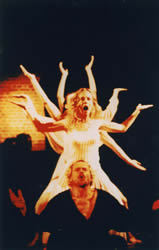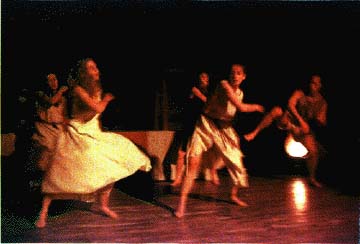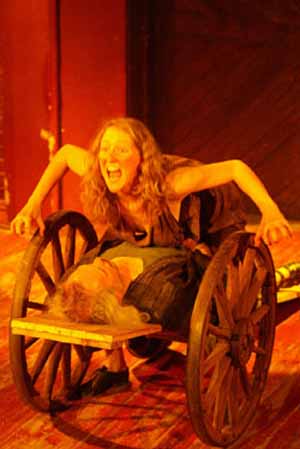
TheaterThe Association of Theatrical Practices Gardzieniceby Peter K. Gessner
The Association of Theatrical Practices Gardzienice
was founded in 1976 by Włodzimierz Staniewski in a village near Lublin which
remains the group's headquarters to this day.
Staniewski had just finished a five-year period of collaboration with Jerzy
Grotowsk's Teatr Laboratorium. The group does create theatrical
productions, but its main work is to conduct research into folk culture, as well
as ethnic and anthropological studies. Members of the group take part in
expeditions. There the shape of future productions is formed, productions which
are evolving more and more closely towards modern mystery plays, restoring
tragedy from the spirit of music. Their production Metamorphoses (1997), based on Apuleius's Golden Ass, reconstructs music and dance of ancient Greece in a tour de force performance, combining contemporary vocal and dance virtuosity with melodic lines, gestures, and postures derived from ancient vases. Subtitled, an ethnooratorio, it was described in the following terms on the website of Double Edge Theatre:
"METAMORPHOSIS, or The Golden Ass According to Apuleius is a unique performance which revives the spirit of pre-Christian energy, joy, and lightness. All is passionately sung. Staniewski's work is known for its original singing which includes a synchronistic interweaving of text, gesture, and body movement. With METAMORPHOSIS, Gardzienice surpasses itself. They sing ancient Greek songs and sounds in unique modalities which were reconstructed from papyrus remains and stone carvings from the 5th century BC to the 2nd century AD. After a period of study, Staniewski came to the conclusion that this pythagorean music was sung and danced vividly, dynamically, and passionately, in the way inherent to indigenous cultures. METAMORPHOSIS is a rediscovery, in the present tense, of the vital energy and the compelling dramaturgy of Ancient Greek theater: a theater in which the song, dance, and text are a natural execution of the extremes of human experience. With eleven singers/actors on stage, the characters in the performance include Lucius, transformed into a donkey and returning to the human shape, Psyche, Amor, and the dual role of Dionysus/Christ."
More recently, Gardzienice has produced "Scenes from Electra" based on Euripides play. Electra is a tragedy in which Princess Electra, is consumed with longing for her assassinated father. Married off to a decent by simple peasant. she plots revenge with her brother Orestes upon his return from exile. She tricks her mother, Clytemnestra, into a peasant's hut so that they can deprive her of life. In creating the spectacle, Staniewski has treated the play as a tragedy of emotions. He used mythical tale of the daughter who so loved her father that she has to kill her mother, to portray exteme emotional states: great love, great hatred, blind lust for hatred, paralizing feeling of guilt. Yet he has subordingate the emotionnaly seething material of the drama, to expressive acting in which primacy is given to fully expressive and meaningful gestures. The first paragraph above is derived from a the materials of Poland's Adam Mickiewicz Institute: the descriptive material regarding "Scenes from Electra" is derived from a 2002 review by Janusz R. Kowalczyk on the pages of the Warsaw daily, Rzeczpospolita. The material on this page may be protected by copyright and should be used for educational and research only. |
| Info-Poland a clearinghouse of information about Poland, Polish Universities, Polish Studies, etc. |


